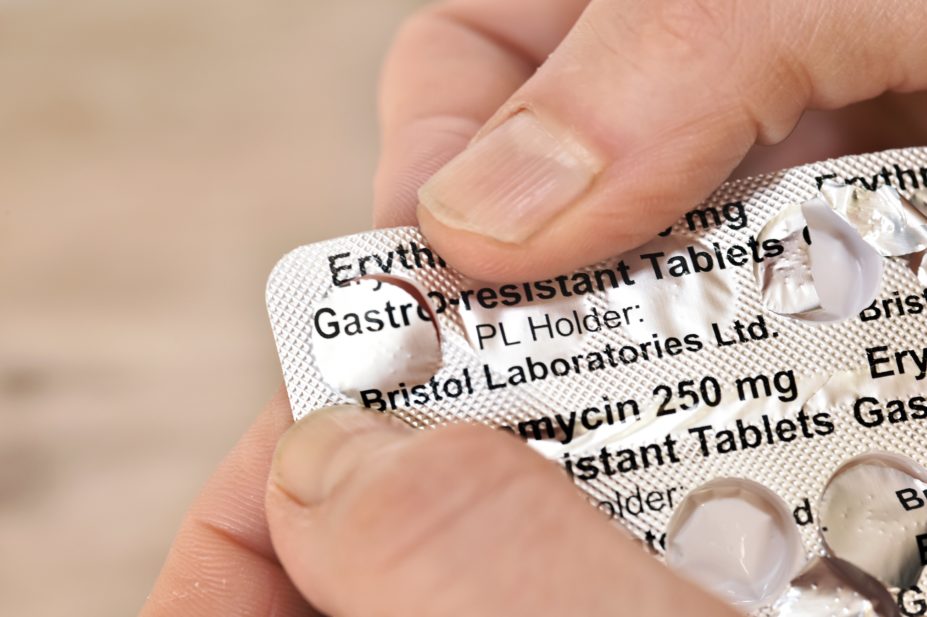
Dr P Marazzi / Science Photo Library
Macrolide antibiotics should be used “with caution” in early pregnancy, researchers who found an associated increased risk of major birth defects have warned.
A large observational study of 104,605 children born in the UK between 1990 and 2016 found use of macrolides, such as erythromycin, clarithromycin and azithromycin, during the first trimester of pregnancy was associated with a 55% increased chance of major birth defects, compared with the use of penicillin (27.7 vs. 17.7 per 1,000).
Reporting their findings in the BMJ on 19 Febuary 2020, the researchers said the increased risk of neonatal heart defects with macrolides was most notable, with a 62% increased risk (10.6 vs. 6.6 per 1,000) compared with penicillin.
Overall, researchers looked at five malformations in the newborn children, including those of the nervous system (1.27 vs. 1.01 per 1,000), gastrointestinal system (1.51 vs. 0.91 per 1,000), genitals (4.75 vs. 3.07 per 1,000) and urinary system (1.39 vs. 1.52 per 1,000) in addition to the cardiovascular system.
They also found macrolide prescribing in any trimester to be associated with a similar increased risk (58%) of neonatal genital malformations.
The researchers reported that there was no association between macrolide antibiotics at any point during pregnancy with an increased risk of neonatal cerebral palsy, epilepsy, attention deficit hyperactivity disorder or autism spectrum disorder.
The study, which also included children whose mothers were prescribed macrolides or penicillins before getting pregnant and siblings of those in the macrolide group as control groups, has raised further concerns about the safety of the drugs in pregnancy.
While the macrolides erythromycin, clarithromycin and azithromycin are among the most frequently prescribed antibiotics during pregnancy in Western countries, some warnings have already been issued — for example, the Medicines and Healthcare products Regulatory Agency (MHRA) advises prescribing alternatives to clarithromycin and azithromycin during all stages of pregnancy.
However, the study results showed that erythromycin in the first trimester was also associated with an increased risk of major malformation in the newborn child.
Study leader Ruth Gilbert, professor of clinical epidemiology at UCL, and colleagues, concluded that, should the results prove to be causal, an additional 4 children with cardiovascular malformations would occur for every 1,000 children exposed to macrolides instead of penicillins in the first trimester.
“These findings call for cautious use of macrolides during pregnancy,” they said.
“Drug safety leaflets should report that there are concerns about the safety of macrolides, including erythromycin, and recommend the use of alternative antibiotics when feasible until further research is available.”
Philip Howard, consultant antimicrobial pharmacist at Leeds Teaching Hospitals NHS Trust, commented: “This paper further reinforces two key messages about antibiotic prescribing: first, antibiotics are not without harm and should only be prescribed when clearly needed”.
“Second, penicillin allergy labels are bad for your health and possibly that of an unborn child.”
He added: “This adds to the growing evidence base that a penicillin label allergy, whether true or otherwise, can result in second-choice antibiotics being prescribed which have more adverse effects, including increased mortality, healthcare acquired infections and colonisation with antibiotic resistant organisms.
“Perhaps now is the time to review the criteria for penicillin allergy testing within the National Institute for Health and Care Excellence drug allergy guidelines.”
Also commenting on the study, Conor Jamieson, pharmacy team leader for antimicrobial therapy at Sandwell and West Birmingham NHS Trust, said: “This study underscores two important points — the need for rapid point-of-care diagnostics to rule out infection in primary care and so avoid unnecessary antibiotic prescriptions for viral infection, and the importance of taking clearly establishing the history of penicillin allergy and documenting this”.
“Presumably, patients who were prescribed erythromycin were given it because of a history of penicillin allergy. Many patients, and healthcare professionals, associate the side effects of penicillin antibiotics — such as diarrhoea and sickness — with allergy and thus potentially deny themselves or their patients access to one of the most useful and safest group of antibiotics at a GP’s disposal.”


